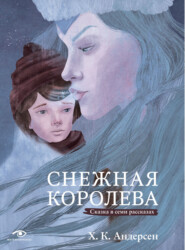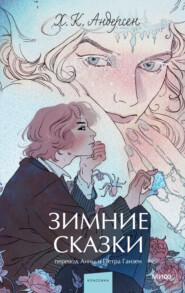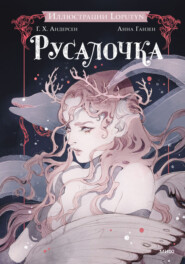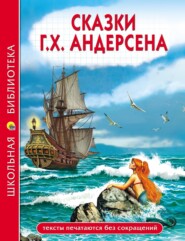По всем вопросам обращайтесь на: info@litportal.ru
(©) 2003-2024.
✖
Wonderful Stories for Children
Настройки чтения
Размер шрифта
Высота строк
Поля
When she was in bed, she lay for a long time thinking how delightful it would be to see the beautiful flowers dancing in the king's castle.
"Can my flowers actually have been there?" and with these words she fell asleep. In the night she woke; she had been dreaming about the flowers, and the student, who the chancellor said stuffed her head with nonsense. It was quite silent in the chamber where Ida lay; the night lamp was burning on the table, and her father and her mother were asleep.
"Are my flowers now lying in Sophie's bed?" said she to herself; "how I should like to know!" She lifted herself up a little in bed, and looked through the door, which stood ajar, and in that room lay the flowers, and all her playthings. She listened, and it seemed to her as if some one was playing on the piano, which stood in that room, but so softly and so sweetly as she had never heard before.
"Now, certainly, all the flowers are dancing in there," said she; "O, how I should like to go and see!" but she did not dare to get up, lest she should wake her father and mother. "If they would only just come in here!" said she; but the flowers did not come, and the music continued to play so sweetly. She could not resist it any longer, for it was so delightful; so she crept out of her little bed, and went, quite softly, to the door, and peeped into the room. Nay! what a charming sight she beheld!
There was not any night lamp in that room, and yet it was quite light; the moon shone through the window into the middle of the floor, and it was almost as light as day. All the hyacinths and tulips stood in two long rows along the floor; they were not any longer in the window, where stood the empty pots. All the flowers were dancing so beautifully, one round another, on the floor; they made a regular chain, and took hold of one another's green leaves when they swung round. But there sat at the piano a great yellow lily, which little Ida had certainly seen in the summer, for she remembered very well that the student had said, "Nay, how like Miss Lina it is!" and they had all laughed at him. But now it seemed really to Ida as if the tall yellow lily resembled the young lady, and that she, also, really did just as if she were playing; now she laid her long yellow face on one side, now on the other, and nodded the time to the charming music. Not one of them observed little Ida.
She now saw a large blue crocus spring upon the middle of the table where the playthings lay, go straight to the doll's bed, and draw aside the curtains, where lay the sick flowers; but they raised themselves up immediately, and nodded one to another, as much as to say, that they also would go with them and dance. The old snapdragon, whose under lip was broken off, stood up and bowed to the pretty flowers, which did not look poorly at all, and they hopped down among the others, and were very merry.
All at once it seemed as if something had fallen down from the table. Ida looked towards it; it was the Easter-wand, which had heard the flowers. It was also very pretty; upon the top of it was set a little wax-doll, which had just such a broad hat upon its head as that which the chancellor wore. The Easter-wand hopped about upon its three wooden legs, and stamped quite loud, for it danced the mazurka; and there was not one of the flowers which could dance that dance, because they were so light and could not stamp.
The wax-doll upon the Easter-wand seemed to become taller and stouter, and whirled itself round above the paper flowers on the wand, and exclaimed, quite loud, "Is that the nonsense to stuff a child's mind with! It is stupid fancy!" – And the wax-doll was precisely like the cross old chancellor with the broad hat, and looked just as yellow and ill-tempered as he did; but the paper flowers knocked him on the thin legs, and with that he shrunk together again, and became a little tiny wax-doll. It was charming to see it! little Ida could hardly help laughing. The Easter-wand continued to dance, and the chancellor was obliged to dance too; it mattered not whether he made himself so tall and big, or whether he were the little yellow wax-doll, with the great black hat. Then came up the other flowers, especially those which had lain in Sophie's bed, and so the Easter-rod left off dancing.
At that very moment a great noise was heard within the drawer where Ida's doll, Sophie, lay, with so many of her playthings; and with this the snapdragon ran up to the corner of the table, lay down upon his stomach, and opened the drawer a little bit. With this Sophie raised herself up, and looked round her in astonishment.
"There is a ball here!" said she, "and why has not anybody told me of it?"
"Wilt thou dance with me?" said the snapdragon.
"Yes, thou art a fine one to dance with!" said she, and turned her back upon him. So she seated herself upon the drawer, and thought that to be sure some one of the flowers would come and engage her, but not one came; so she coughed a little, hem! hem! hem! but for all that not one came. The snapdragon danced alone, and that was not so very bad either!
As now none of the flowers seemed to see Sophie, she let herself drop heavily out of the drawer down upon the floor, – and that gave a great alarum; all the flowers at once came running up and gathered around her, inquiring if she had hurt herself; and they were all so exceedingly kind to her, especially those which had lain in her bed. But she had not hurt herself at all, and all Ida's flowers thanked her for the beautiful bed, and they paid her so much attention, and took her into the middle of the floor, where the moon shone, and danced with her, while all the other flowers made a circle around them. Sophie was now very much delighted; and she said they would be very welcome to her bed, for that she had not the least objection to lie in the drawer.
But the flowers said, "Thou shalt have as many thanks as if we used it, but we cannot live so long! To-morrow we shall be quite dead; but now tell little Ida," said they, "that she must bury us down in the garden, where the canary-bird lies, and so we shall grow up again next summer, and be much prettier than ever!"
"No, you shall not die," said Sophie, and the flowers kissed her. At that very moment the room door opened, and a great crowd of beautiful flowers came dancing in. Ida could not conceive where they came from; they must certainly have been all the flowers out of the king's castle. First of all went two most magnificent roses, and they had little gold crowns on; they were a king and a queen; then came the most lovely gilliflowers and carnations, and they bowed first on this side and then on that. They had brought music with them; great big poppies and pionies blew upon peapods till they were red in the face. The blue-bells and the little white convolvuluses rung as if they were musical bells. It was charming music. Then there came in a many other flowers, and they danced all together; the blue violets and the red daisies, the anemones and the lilies of the valley; and all the flowers kissed one another: it was delightful to see it!
At last they all bade one another good-night, and little Ida also went to her bed, where she dreamed about every thing that she had seen.
The next morning, when she got up, she went as quickly as she could to her little table, to see whether the flowers were there still; she drew aside the curtains from the little bed; – yes, there they all lay together, but they were quite withered, much more than yesterday. Sophie lay in the drawer, where she had put her; she looked very sleepy.
"Canst thou remember what thou hast to tell me?" said little Ida; but Sophie looked quite stupid, and did not say one single word.
"Thou art not at all good," said Ida, "and yet they all danced with thee."
So she took a little paper box, on which were painted beautiful birds, and this she opened, and laid in it the dead flowers.
"This shall be your pretty coffin," said she, "and when my Norwegian cousins come, they shall go with me and bury you, down in the garden, that next summer you may grow up again, and be lovelier than ever!"
The Norwegian cousins were two lively boys, who were called Jonas and Adolph; their father had given them two new cross-bows, and these they brought with them to show to Ida. She told them about the poor flowers which were dead, and so they got leave to bury them. The two boys went first, with their cross-bows on their shoulders; and little Ida came after, with the dead flowers in the pretty little box. Down in the garden they dug a little grave. Ida kissed the flowers, and then put them in their box, down into the earth, and Jonas and Adolph stood with their cross-bows above the grave, for they had neither arms nor cannon.
THE CONSTANT TIN SOLDIER
There were, once upon a time, five-and-twenty tin soldiers; they were all brothers, for they were born of an old tin spoon. They held their arms in their hands, and their faces were all alike; their uniform was red and blue, and very beautiful. The very first word which they heard in this world, when the lid was taken off the box in which they lay, was, "Tin soldiers!" This was the exclamation of a little boy, who clapped his hands as he said it. They had been given to him, for it was his birthday, and he now set them out on the table. The one soldier was just exactly like another; there was only one of them that was a little different; he had only one leg, for he had been the last that was made, and there was not quite tin enough; yet he stood just as firmly upon his one leg as they did upon their two, and he was exactly the one who became remarkable.
Upon the table on which he had set them out, there stood many other playthings; but that which was most attractive to the eye, was a pretty little castle of pasteboard. One could look through the little windows as if into the rooms. Outside stood little trees, and round about it a little mirror, which was to look like a lake; swans of wax swam upon this, and were reflected in it. It was altogether very pretty; but the prettiest thing of all was the little young lady who stood at the open castle door, for she was a dancer; and she lifted one of her legs so high in the air, that the tin soldier might almost have fancied that she had only one leg, like himself.
"That is a wife for me!" thought he, "but she is a great lady; she lives in a castle, I in nothing but a box; and then we are five-and-twenty of us, there is no room for her! Yet I must make her acquaintance!"
And so he set himself behind a snuff-box, which stood on the table, and from thence he could very plainly see the pretty little lady, which remained standing upon one leg, without ever losing her balance.
That continued all the evening, and then the other tin soldiers were put into their box, and the people of the house went to bed. The playthings now began to amuse themselves; they played at company coming, at fighting, and at having a ball. The tin soldiers rattled about in their box, for they wanted to be with the rest of the things, but they could not get the box lid off. The nutcrackers knocked about the gingerbread nuts, and the slate-pencil laughed with the slate; it was so entertaining that the canary-bird awoke, and began to chatter with them also, but she chattered in verse. The only two which did not move from their place were the tin soldier and the little dancing lady. She kept herself so upright, standing on the point of her toe, with both her arms extended; and he stood just as steadily upon his one leg, and his eyes did not move from her for one moment.
It now struck twelve o'clock, and crash! up sprang the lid of the snuff-box, but there was no snuff in it; no, there was a little black imp – it was a jack-in-the-box.
"Tin soldier!" said the imp, "keep thy eyes to thyself!"
But the tin soldier pretended that he did not hear.
"Yes, we shall see in the morning!" said the imp.
And now it was the next morning, and the children got up, and they set the tin soldier in the window, – and either it was the imp, or else it was a sudden gust of wind, but the casement burst open, and out went the tin soldier, head foremost, down from the third story! It was a horrible fall, he turned head over heels, and remained standing with his one leg up in the air, and with his bayonet down among the stones of a sink.
The maid-servant and the little boy went down directly to seek for him, but although they almost trod upon him, still they could not see him. If the tin soldier had only shouted out, "Here I am!" they would have found him; but he did not think it would be becoming in him to shout out when he had his uniform on.
It now began to rain; one drop fell heavier than another; it was a regular shower. When it was over there came up two street boys.
"Look here!" said one of them, "here lies a tin soldier. He shall have a sail!"
So they made a boat of a newspaper, and set the tin soldier in it, and now he sailed down the kennel; the two lads ran, one on each side, and clapped their hands. Dear me! what billows there were in the uneven kennel, and what a torrent there was, for it had poured down with rain! The paper boat rocked up and down, and whirled round so fast! The tin soldier must have trembled, but he showed no fear at all, he never changed his countenance, and stood holding his weapon in his hand.
Just then the boat was driven under a large arch of the kennel, and it was as dark to the tin soldier as if he had been in his box.
"Where am I now come to?" thought he; "yes, yes, it is all that imp's doing! Ah! if the little dancing lady were only in the boat, I would not mind if it were twice as dark!"
At that moment up came a great big water-rat, which lived under the kennel's archway.
"Have you a passport?" asked the rat. "Out with your passport!"
But the tin soldier said not a word, and stood stock still, shouldering his arms. The boat shot past, and the rat came after. Ha! how he set his teeth, and cried to the sticks and the straws, —
"Stop him! stop him! he has not paid the toll! He has not shown his passport!"
But the stream got stronger and stronger. The tin soldier could already see daylight at the end of the tunnel, but at the same time he heard a roaring sound, which might well have made a bolder man than he tremble. Only think! where the tunnel ended, the water of the kennel was poured down into a great canal; which would be, for him, just as dangerous as for us to sail down a great waterfall!
He was now come so near to it that he could no longer stand upright. The boat drove on; the tin soldier held himself as stiff as he could; nobody could have said of him that he winked with an eye. The boat whirled round three times, and filled with water to the very edge – it must sink! The tin soldier stood up to his neck in water! Deeper and deeper sank the boat, the paper grew softer and softer! Now went the water above the soldier's head! – he thought of the little dancing lady, whom he should never see more, and it rung in the tin soldier's ear, —
"Fare thee well, thou man of war!
Death with thee is dealing!"
The paper now went in two, and the tin soldier fell through; and at that moment was swallowed by a large fish!
Nay, how dark it was now in there! It was darker than in the kennel archway, and much narrower. But the tin soldier was steadfast to his duty; and he lay there, shouldering his arms. The fish twisted about, and made the most horrible sort of movements; at last it became quite still; a flash of lightning seemed to go through it. Light shone quite bright, and some one shouted aloud, "Tin soldier!"
The fish had been caught, taken to market, sold, and brought into the kitchen, where the servant-girl cut it up with a great knife. She took the soldier, who was as alive as ever, between her two fingers, and carried it into the parlor, where she showed them all what a remarkable little man had been travelling about in the stomach of the fish! But the tin soldier was not proud. They set him upon the table, and there – Nay, how wonderfully things happen in this world! – the tin soldier was in the self-same room he had been in before; he saw the self-same child, and the self-same playthings on the table; the grand castle, with the pretty little dancing lady standing at the door. She was standing still upon one leg, with the other raised; she also was constant. It quite affected the tin soldier, he was ready to shed tin tears, only that would not have been becoming in him. He looked at her, and she looked at him, but neither of them said a word.

















